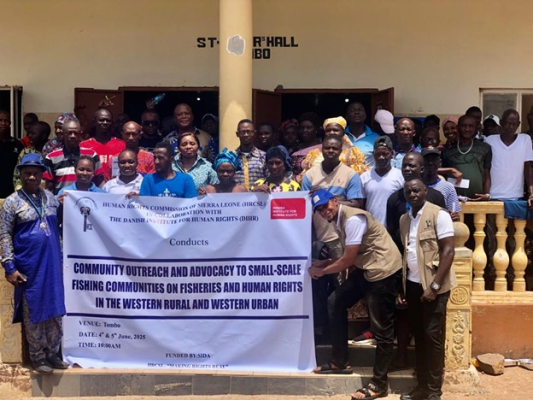HRCSL NEWS AND EVENTS

Posted By: John Peter Fuller ⇒ Posted Date: 6/20/2025
At HRCSL’s Community Outreach, Small-Scale Fishers Demand a Voice In the windswept communities of Tombo and Funkia, the ocean is not merely a backdrop; it is a way of life. Here, the rhythm of the waves governs everything, from mealtimes to market days. However, for small-scale fishers, that rhythm is no longer consistent. It is being disrupted by trawlers, commercial interests, and an increasing sense of powerlessness. On June 4th and 12th, 2025, the Human Rights Commission of Sierra Leone (HRCSL brought together 100 small-scale fishers to talk about something too often ignored: their rights. The engagement, part of the Sustainable Oceans project—a collaborative effort involving the Commission and the Danish Institute for Human Rights, supported by the Swedish International Development Cooperation Agency—is not merely another seminar. It aims to raise awareness about critical human rights issues affecting small-scale fishing communities and establish community-led Human Rights Committees within these communities, providing effective monitoring for problems such as child labour, sea safety, and marine intrusion. In February this year, the Ministry of Fisheries and Marine Resources implemented a month-long closure of artisanal fishing activities to protect fish stocks. The move was to allow fish populations to replenish during their spawning period. At St. Peter’s Hall in Tombo and the Funkia Community Centre, fishermen, harbour masters, and community leaders didn’t just list their grievances; they told stories of lost livelihoods, broken nets, and fading hope. For Abdul Rahman Sesay of Tokeh Community, this was more than a community outreach. It was an overdue platform. “We now use almost 150 litres of fuel for a trip that used to take half that. The trawlers push us farther into dangerous waters, and even then, we return with empty nets,” he lamented. He described a time when artisanal fishers could rely on familiar inshore waters. Now, with industrial vessels invading their traditional zones, they are forced to take longer, riskier journeys with dwindling returns. Momoh M. Bangura, Harbour Master of Goderich, also expressed concerns beyond the catch. “We are seeing a lot of child labour and child neglect. Children are left to take care of the home while their parents are in the high seas or the marketplaces,” he said. These social side effects, often invisible, show how environmental and economic pressure erode family and community structures. The Sierra Leone’s Fisheries and Aquaculture Act prescribes fines for industrial vessels intruding into the Inshore Exclusion Zone (IEZ)—waters reserved for artisanal fishers. As waves crash along the shoreline and fishers mend their nets, one message is clear: these communities don’t want pity. They want respect. And with each engagement, that fight for dignity is finding its voice. The Human Rights Commission of Sierra Leone stands ready to continue engaging the fishing communities, particularly small-scale fishers, to ensure that issues hindering their human rights are addressed, while they also keep the peace when they feel aggrieved. ©HRCSL Communications Team